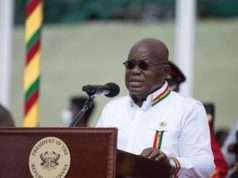Minister for Information Mr. Kojo Oppong Nkrumah has described government’s decision to cut its approved expenditure for 2023 fiscal year from GH¢227.7 billion to GH¢206 billion as highly commendable.
Government, he indicated, has decided to reduce the expenditure because of its strong belief in the importance of this fiscal discipline in achieving economic stability and adhering to deficit constraints it has set for itself.
Mr. Oppong Nkrumah stated these whilst contributing to the Mid-Year Budget Review Statement presented by the Minister for Finance, Mr. Ken Ofori-Atta to Parliament on Monday.
“I think one of the first things to note is that the appropriation has been reduced by GH¢21 billion and I think for those who pay attention to fiscal policy or to the fiscal framework, that is a good thing except that GH¢10 billion of that is somewhere around interest payment and the rest is spread across the various expenditure lines.
“Nonetheless, it’s a reduction in the appropriation of the government expenditure and I think that it is something that should give people some comfort that we are doing well to stay within the deficit constraints that we have imposed upon ourselves,” he added.
Mr. Oppong Nkrumah who is also the Member of Parliament (MP) for Ofoase/Ayirebi whilst acknowledging that a portion of the reduction was allocated to interest payments, emphasised that the overall decrease in expenditure signals the government’s determination to streamline its financial resources and prioritize development initiatives.
He underscored the need to learn from the current economic landscape and make informed decisions to support the country’s economic growth.
Mr. Oppong Nkrumah said government remained steadfast in bolstering financial stability, which was a key theme highlighted by Finance Minister Ken Ofori-Atta during the budget presentation.
The mid-year budget review provided an opportunity to assess the country’s economic performance and evaluate fiscal policies to ensure they are aligned with national development priorities.
The reduction in government expenditure reflects the impact of the successful Domestic Debt Exchange Programme (DDEP), which has created fiscal space for growth-enhancing reforms and managed rising debt costs.
The budget review also highlighted government’s growth agenda, which prioritizes inclusive development and private sector investments to stimulate job creation and sustainable economic growth.
Key growth-oriented programmes, such as the Planting for Food and Jobs (PFJ) Phase II, aim to strengthen agriculture and value-addition, providing opportunities for the youth and fostering economic diversification.
Renew shortfall
Minister for Finance Mr. Ken Ofori-Atta in announcing the expenditure cuts indicated that for the first six months of the year, government has seen improvements in tax revenue, and it is on course to meet our targets for the year.
He however pointed out that oil revenues have fallen short of expectations due to changes in global prices.
“We will, therefore, undertake a downward review of expenditures to align with the underperformance of some of our revenue handles. This will impact the Annual Budget Funding Amount (ABFA) and thus reduce the 2023 Appropriation.
“We are proposing a downward revision of the Appropriation 2022 to GH¢206 billion in line with Regulations 24 sub-regulation (3) of the Public Financial Management Act Regulations 2019 (L.I. 2378)”.









































